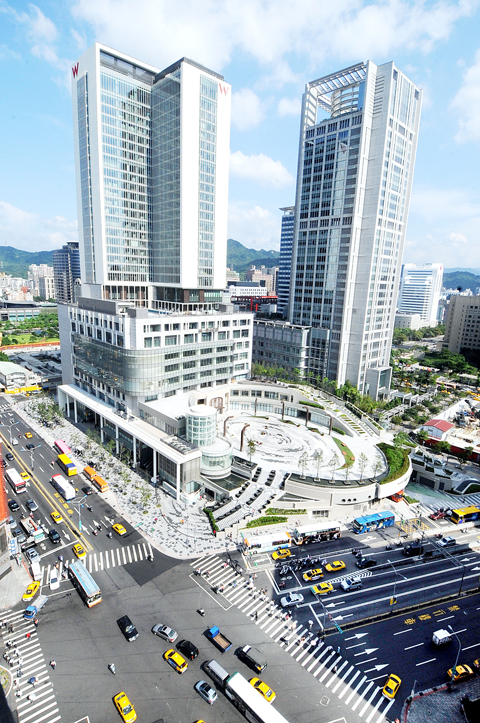Taipei City Hall Bus Station, the major transit hub between Taipei and northern and central Taiwan, opened to the public yesterday, with traffic jams in surrounding areas expected to intensify as a result.
More than 1,700 buses from 14 bus companies will travel daily in and out of the station, which is located at the intersection of Keelung Road and Zhongxiao E Road, and is expected to see about 10,000 people pass through every day between Taipei and Keelung, Yilan, Taoyuan, Hsinchu, Miaoli and Taichung.
Although the Traffic Police Division dispatched more than 140 traffic police to control traffic around the station, Keelung Road and Zhongxiao E Road Sec 5 — which are traditionally crowded during rush hour — still experienced heavier traffic jams.

PHOTO: FANG PIN-CHAO, TAIPEI TIMES
Speaking at the opening ceremony, Taipei Mayor Hau Lung-bin (郝龍斌) called on the public to be patient during the “transition period,” adding that the station was expected to boost businesses in Xinyi District (信義).
“We will use the successful model used at Taipei Bus Station in west Taipei. Taipei City Hall Bus Station, along with the shopping mall above, will bring more people and business opportunities to the Xinyi area,” he said.
The bus station was a build-operate-transfer project under the city government. Its terminals and waiting area occupy about 2,400 ping (7,934m²) of the 43,000 ping building.
The 31-story building, built by Uni-President Group, also features a shopping mall and a hotel.
The Uni-President Hankyu Department Store — a joint venture between Taiwan’s and Japan’s Hankyu Hanshin Department Stores — will open in October.
Democratic Progressive Party Taipei City Councilor Hsu Shu-hua yesterday blamed the traffic congestion on the small space at the bus station and accused the city government of favoring private enterprises by giving up most of the space to contractors for the shopping mall.
“The traffic will only get worse when the shopping mall opens and attracts large crowds,” she said.
Passengers also complained about a lack of seats in the waiting area, urging the city government to improve the situation.
“It’s hard to believe there are only two rows of seats at the bus station. Most people are forced to stand around with their luggage. The city government should not have made such a mistake,” said Huang Ai-ju (黃愛如), a Taipei resident waiting for a bus to Yilan.
Luo Shiaw-shyan (羅孝賢), commissioner of the city’s Department of Transportation, said the waiting area had 77 seats, adding that this was sufficient because most bus routes served short-distance commutes, which required short waiting periods for passengers.
He dismissed concerns that the seating area was purposely designed to be small to provide more room for the shopping areas. He said the department could always add more seats if needed.

Taipei has once again made it to the top 100 in Oxford Economics’ Global Cities Index 2025 report, moving up five places from last year to 60. The annual index, which was published last month, evaluated 1,000 of the most populated metropolises based on five indices — economics, human capital, quality of life, environment and governance. New York maintained its top spot this year, placing first in the economics index thanks to the strength of its vibrant financial industry and economic stability. Taipei ranked 263rd in economics, 44th in human capital, 15th in quality of life, 284th for environment and 75th in governance,

A former officer in China’s People’s Liberation Army (PLA) who witnessed the aftermath of the 1989 Tiananmen Square massacre has warned that Taiwan could face a similar fate if China attempts to unify the country by force. Li Xiaoming (李曉明), who was deployed to Beijing as a junior officer during the crackdown, said Taiwanese people should study the massacre carefully, because it offers a glimpse of what Beijing is willing to do to suppress dissent. “What happened in Tiananmen Square could happen in Taiwan too,” Li told CNA in a May 22 interview, ahead of the massacre’s 36th anniversary. “If Taiwanese students or

Greenpeace yesterday said that it is to appeal a decision last month by the Taipei High Administrative Court to dismiss its 2021 lawsuit against the Ministry of Economic Affairs over “loose” regulations governing major corporate electricity consumers. The climate-related lawsuit — the first of its kind in Taiwan — sought to require the government to enforce higher green energy thresholds on major corporations to reduce emissions in light of climate change and an uptick in extreme weather. The suit, filed by Greenpeace East Asia, the Environmental Jurists Association and four individual plaintiffs, was dismissed on May 8 following four years of litigation. The

The New Taipei City Government would assist relatives of those killed or injured in last month’s car-ramming incident in Sansia District (三峽) to secure compensation, Mayor Hou You-yi (侯友宜) said yesterday, two days after the driver died in a hospital. “The city government will do its best to help the relatives of the car crash incident seek compensation,” Hou said. The mayor also said that the city’s Legal Affairs, Education and Social Welfare departments have established a joint mechanism to “provide coordinated assistance” to victims and their families. Three people were killed and 12 injured when a car plowed into schoolchildren and their